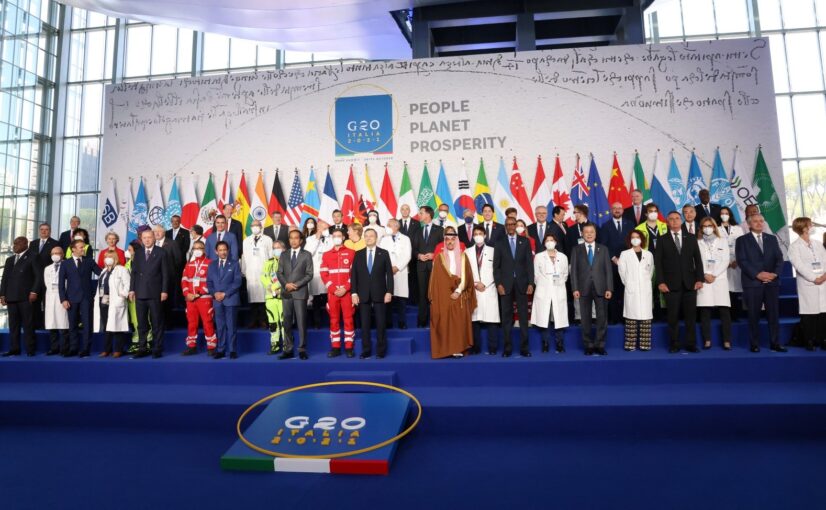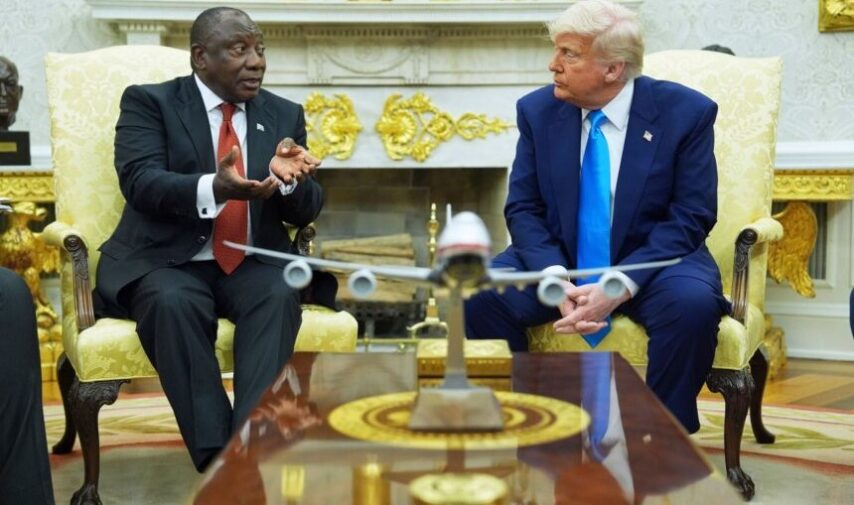Trump boycotts upcoming G20 summit hosted by South Africa

BY JIBRIL TURE
The G20, a forum of 19 developing and developed nations plus the European Union and the African Union, will hold its 20th annual summit for the first time in Africa for three days starting tomorrow November 22, with South Africa as host. The United States, which is a member of the organization, will be absent because its hardcore racist president continues to falsely accuse the South African government for the “killing and slaughter” of Afrikaners and the “illegal confiscation” of their farms and land.
In a post two weeks ago on his social media platform Truth Social, Trump pushed the lies he previously told about the South African government: “Afrikaners are being killed and slaughtered, and their land and farms are being illegally confiscated.” For that unfounded reason, Trump added, “No U.S. Government Official will attend [the South Africa-hosted G20 summit] as long as these Human Rights abuses continue.”
Having ignored Trump’s remarks at first, South Africa’s president, Cyril Ramaphosa, finally hit back this week by telling reporters: “The United States, by not being at the G20, must never think that we are not going to go on with the G20. The G20 will go on. All other heads of state will be here. In the end, we will take fundamental decisions, and their absence is their loss.”
This scenario is the repeat of Trump’s ambush of Ramaphosa last May during the meeting of the two leaders at the White House when Trump’s racism exploded—expectedly.

The conversation at the White House six months ago kicked off smoothly, as the two leaders touched on light subjects. Ramaphosa spent a good three minutes discussing the historic good relations between the two nations, emphasizing his desire to keep up the good relationship, especially in the area of trade. In a joking tone, Trump asked “How did you get my number?” He then brought up his previously stated false claims about genocide of South African white farmers. “We’ve had tremendous complaints about Africa, about other countries, too, from people,” Mr. Trump started, adding, “They say there’s a lot of bad things going on in Africa, and that’s what we’re going to be discussing today.”
A dismayed Ramaphosa stayed quiet for a while, then Trump displayed a few newspaper clips showing pictures of bloody white South Africans, after which he ordered that a video alleging the killing of white South Africans be played.
The video included a footage of Black people calling for violence against white South African farmers. One could see in one of the footages crosses planted along a rural road stretching far into the distance, which Mr. Trump described as part of a burial site for murdered white farmers. The truth is those crosses had nothing to do with a burial. They were planted by activists staging a protest against farm murders.
In his rebuttal, a calm Ramaphosa said that the person in the video who called for violence against white farmers did not speak for the South African government. He acknowledged that violence does erupt sometimes, but added that the victims were often Black people, not the other way around.
In reference to the fifty or so white South Africans to whom Trump has granted a refugee status while refusing to do so for other people, including Afghans who have assisted with the U.S. war effort in Afghanistan, Trump made his usual fuzzy remarks when asked questions that he does not have answers to.
The G20 summit is an important event. Members include Argentina, Australia, Brazil, Canada, China, France, Germany, India, Indonesia, Italy, Japan, Republic of Korea, Mexico, Russia, Saudi Arabia, South Africa, Türkiye, United Kingdom, and United States and two regional bodies, namely the European Union and the African Union. The summit provides the opportunity for its members to discuss financial and socioeconomic issues, aiming to foster global economic stability and prosperity. Collectively, G20 members represent around 87% of global GDP, 62% of the world’s population, and over 75% of global trade. Throughout the year, representatives from G20 countries gather to discuss financial and socioeconomic issues, aiming to foster global economic stability and prosperity.
U.S. boycott decided by a business unfriendly, failed businessman who was banned from doing business in New York, where he started, because of illegal practices, may be shocking, but fully explainable when one looks closely.
In an article published on TRT Afrika, Producer Emmanuel Oduor shared the view expressed by several experts that “Trump’s boycott of the Johannesburg G20 summit is less about his concerns over South Africa’s domestic policies and more a reflection of growing attacks on multilateral bodies that give Africa a chance to engage with the world’s richest nations.”
“These are early signs. I think more negative developments are going to come when members of these bodies choose not to participate for selfish reasons,” Oduor quotes Prof David Monyae of the University of Johannesburg as saying.
“It speaks to an imperialistic notion where Africa should be an appendage of the Western world, something that the Global South is fighting through calls for transformation of multilateral institutions like the World Bank and the UN Security Council.”
One should have expected the above and worse from an erratic Trump who did not hesitate one bit to impose tariffs left and right, pushing the global economy to the bring of chaos.

